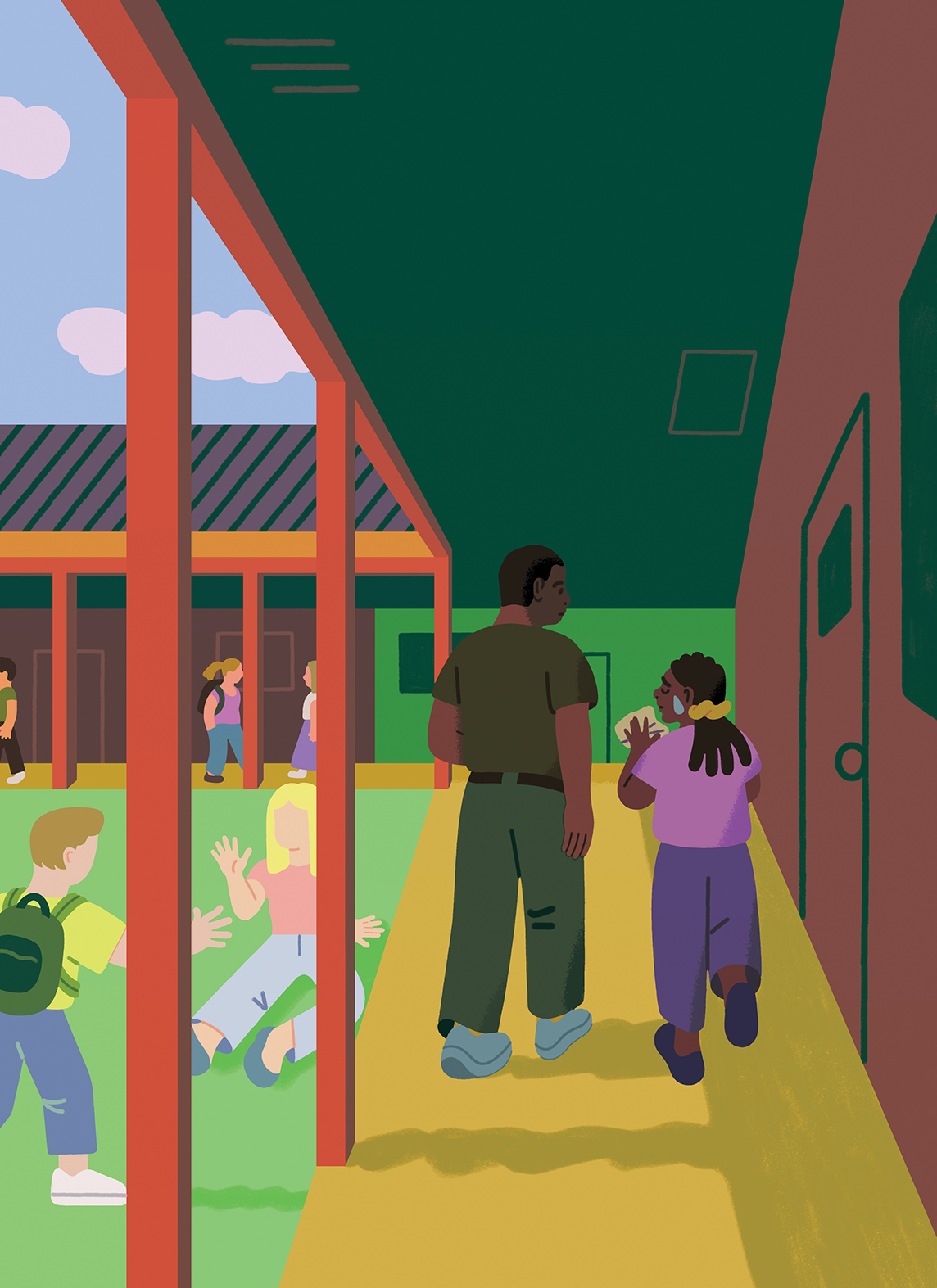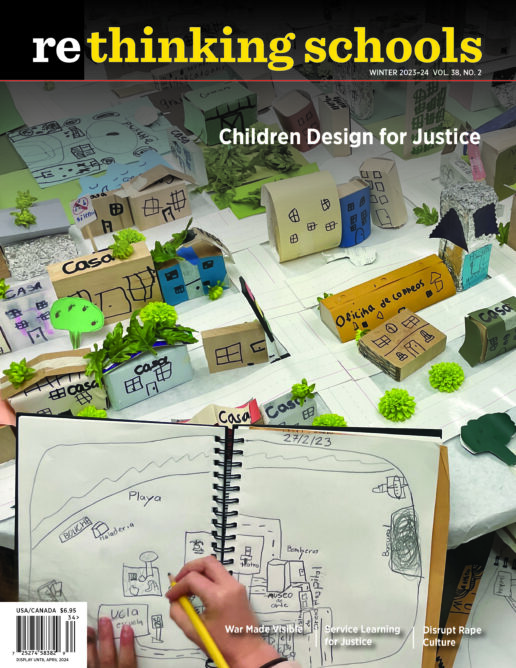If I Could Rewind That Morning
Illustrator: Sophia Foster-Dimino

“This world isn’t kind to us, is it?”
Disguising the statement as a question I echoed the words of my father some years before. Knowing that he too was asked this at some point in his early youth. I felt Aaliyah look up at me, tears probably clouding her vision. I wanted nothing in the world but to take her pain, but we already shared it. This kind of pain is the generational type. A rite of passage. Or maybe this was an accumulated burden. How was I at 19 supposed to give advice to this young girl? I was searching for my place as well. We were both looking to be accepted, and I mean truly welcomed into this learning utopia.
Let me explain.
This was my first job where I did not leave each night with pruned fingertips and the front of my shirt soaking wet. Where I did not have to prepare eight-quart tubs of ranch dressing from flavor powder packets and boxes of mayonnaise. Riding the Blue Line of the MAX home with the stench of grilled steak and chicken lingering in my clothes was a thing of the past. I felt the importance of this position in my core. To be honest, I did not see myself working in schools, but here I was: a teaching assistant to a group of committed, mindful, and innovative elementary educators.
In this elementary school, walking into a classroom was a moment of joy. Deep learning showed itself in the large posters above classroom art studios and meeting spaces with a call to engage in playful but rigorous dialogue: “What can experimenting with clay teach us about how communities structure themselves?” Student work was carefully placed, gallery style on each wall. Multitudes of making materials sat on exposed shelving waiting to be explored, inviting the learners to use them as tools, and sometimes toys. Colored pencils, watercolors, tempera paints, acrylic paints, and oil pastels were a reminder that this was a space for all. All wooden furniture complemented the multiplication models illustrated by flower petals and cottonwood trees, because the natural world is a teacher too. In this classroom it seemed understood that different people need different things to learn. If a particular task did not grab a student’s attention they had the power to negotiate and pivot to a different approach to demonstrate understanding. Wobble seats at this desk for that student, a standing desk over there for another. You could feel the trust in the room. Trust in students to take care of the space. Trust in the teachers to facilitate learning. Trust almost filled the room.
Aaliyah did not get the benefit of that full trust. Instead she had to learn that school as an idea has been curated with a select few in mind. A certain set of values dictates how students should show up in a learning space. Even in classrooms where conventional values are challenged and disrupted there are remnants of those values that linger. One is that teachers need to maintain order. When that control is challenged, the multi-headed guard dog of fear is sicced on those unwilling to fall in line.
Aaliyah challenged the order of her 5th-grade classroom — simply by being her charismatic self. At 10 years old, Aaliyah stood inches above her classmates. She would weave in and out of defenders on the soccer pitch. On the basketball court, she could sink most of her jump shots like butter. Academically, she reigned Supreme Mathematician of her peers. And despite carrying the playful, joyful, curious air of any 5th grader she seemed to understand the world in ways her cohort did not.
Just as much as her classmates wanted her to be on their team at recess or group in class, they feared her. Although they would never say it, her teachers did too. They feared the armor she wore. The armor donned so elegantly by Black and Brown youth in response to the world’s inability to accept our natural state. Armor that is illuminated by pride, Black is beautiful and Black don’t crack. Armor required to take the brunt of misjudgment. Chipped and continuously battered by microaggressions and unchecked prejudice.
Aaliyah and I found solace in being two specks of color in the field of white. We found community within the difference we shared. Beyond our melanated skin, this school was another thing that Aaliyah and I had in common. About a decade earlier I had been a student here. We loved this school because it showed us the joy that learning can bring. How our peers and leaders reacted to our joy was the issue.
As a student in this school I was given the gift of a strong foundation on which to think and express my ideas. My teachers guided me and many classes of students to answer our own queries by turning our curiosities into projects and being curious with us. They created spaces where wonder and self-identity are married with rigor and high expectations for learning. I remember coming home in 1st grade to talk to my family about the meaning of metacognition as a result of a well-facilitated discussion about the importance of artist statements. The overall atmosphere of this school brought me back as an adult. I recognized the impact that the school had on me and the ideas I carried throughout my life and I wanted to be a part of that.
My position as a TA allowed me to see behind the scenes of my own education. I saw students taking control of their own learning by leading Socratic seminars where Jacqueline Woodson’s Brown Girl Dreaming was the fuel of dialogue. Or using protest signs as a jumping-off point for opinion writing. Both teachers and students were engaged in the learning.
My primary duty was to the 5th-grade, or Sequoia, classroom. I aided Shelly, the classroom teacher, managing classroom materials, note-taking during important class conversations, and helping students during work time. This morning however she had a new ask of me.
“Good morning, Xavier!” Shelly said. The MAX had been ahead of schedule this morning. I was a bit early but I could tell she was waiting. She continued speaking before I could even greet her. “Some parents have complained that Aaliyah has been bullying the class.”
Bullying the class? Not just one or two students, but the class? I knew the way Aaliyah celebrated her successes audibly. I observed how students would react, asking her to quiet down, misinterpreting her celebration of learning as boasting. If she joined a game and was on the opposing team, I watched as her classmates got upset and made their case about how it was unfair. I did not see Aaliyah attempting to harm or intimidate anyone in her community.
My mind pulsed with frustration. Racing with things I wish I would have voiced. “I am going to have a meeting with her when she gets to school. I am inviting Allison. Will you get the class settled and bring them to the carpet for Morning Meeting?” As much as I disliked the proposition, Shelly was one of my mentors, inspirations, and most importantly, my boss.
I knew the only answer. “Sure thing.” Her mind was already made. She had invited the school’s equivalent of the dean of students and school was starting in a little more than half an hour. That was that.
Now, I don’t know what exactly was said. I do not know how it was said. The conversation took 15 minutes, maybe less. Aaliyah walked out of that room. Attempting to maintain dignity. She was followed by two women, ready to resume the day and the duties that came with it. Aaliyah looked at me, and broke.
I failed her.
“Can you — ” Shelly gestured to me to salvage the remains of her ambush. I was a part of it, I didn’t stop it.
Aaliyah and I walked out of the classroom. Me carrying guilt, tissue, her water bottle.
“This world isn’t kind to us, is it?” I said, facing forward.
“What did I even do?” she asked me.
“I don’t know, but we’ll keep it pushin’.” My attempt at consolation. We walked in silence for another five or so minutes. Then it was time for math.
If I could rewind that morning, I would have prevented that meeting from ever happening. Maybe I would have told Shelly I was not up to leading that morning. I would have asked her if we could explore a different approach to addressing this misconception between perspectives. I would have made sure that Aaliyah was able to give voice to her actions and be actively listened to. I would have not allowed a dent to be made in her armor. But the truth is that at some point, somewhere this was going to happen. This is repeated time and again. This, in some respect, happened to me many times throughout my academic career. I hope that for Aaliyah’s sake it didn’t happen much for her after this, but maybe that is just wishful thinking.
The reality is that I cannot rewind that morning. I was taught a hard lesson that day. Building spaces that are inclusive is not one size fits all. It took generations to build these expectations, and my hope is that it does not take as many to shift them in a way that welcomes learners of all walks of life.

